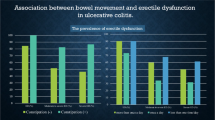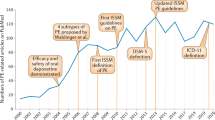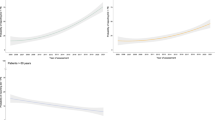Abstract
This study investigated the correlation between irritable bowel syndrome (IBS) and organic erectile dysfunction (OED) and psychogenic erectile dysfunction (PED), and analyzed the influence of various comorbidities. Data were obtained from reimbursement claims of the National Health Insurance Program in Taiwan. We selected male patients aged >20 years, who were diagnosed with IBS during the 2000–2011 period as the IBS cohort. The index date for patients with IBS was the date of their first medical visit. We excluded patients with a diagnosis of OED and PED at baseline and those without information on age and sex. The IBS to non-IBS cohorts were estimated using univariable and multivariable Cox proportional hazards regression model. Adjusted hazard ratios were determined after adjusting for age and comorbidities. The Kaplan–Meier method was used to plot the cumulative incidence of OED and PED, and a log-rank test was used to compare the cohorts. A total of 15 533 IBS patients and 62 124 controls without IBS were enrolled in our study. Among the study participants, 48.2% were 49 years of age or younger. Patients with IBS were more likely to develop erectile dysfunction (ED) than those without IBS. Patients with IBS were 2.12 times more likely to develop OED and 2.38 times more likely to develop PED than the controls. There is an increased risk of both PED and OED in patients with IBS. Not only with organic but also PED should be considered when patients with IBS complain of ED.
This is a preview of subscription content, access via your institution
Access options
Subscribe to this journal
Receive 8 print issues and online access
$259.00 per year
only $32.38 per issue
Buy this article
- Purchase on Springer Link
- Instant access to full article PDF
Prices may be subject to local taxes which are calculated during checkout

Similar content being viewed by others
References
Fond G, Loundou A, Hamdani N, Boukouaci W, Dargel A, Oliveira J et al. Anxiety and depression comorbidities in irritable bowel syndrome (IBS): a systematic review and meta-analysis. Eur Arch Psychiatry Clinical Neurosci 2014; 264: 651–660.
Cho HS, Park JM, Lim CH, Cho YK, Lee IS, Kim SW et al. Anxiety, depression and quality of life in patients with irritable bowel syndrome. Gut Liver 2011; 5: 29–36.
Lewis RW, Fugl‐Meyer KS, Corona G, Hayes RD, Laumann EO, Moreira ED Jr et al. Definitions/epidemiology/risk factors for sexual dysfunction. J Sex Med 2010; 7: 1598–1607.
Park K, Hwang EC, Kim S-O . Prevalence and medical management of erectile dysfunction in Asia. Asian J Androl 2011; 13: 543–549.
Shaeer O, Shaeer K . The Global Online Sexuality Survey (GOSS): the United States of America in 2011. Chapter I: erectile dysfunction among english‐speakers. J Sex Med 2012; 9: 3018–3027.
Ahmed A, Alnaama A, Shams K, Salem M . Prevalence and risk factors of erectile dysfunction among patients attending primary health care centres in Qatar. East Mediterr Health J 2011; 17: 587–592.
Chao CH, Lin CL, Wang HY, Sung FC, Chang YJ, Kao CH . Increased subsequent risk of erectile dysfunction in patients with irritable bowel syndrome: a nationwide population‐based cohort study. Andrology 2013; 1: 793–798.
Shekhar C, Monaghan PJ, Morris J, Issa B, Whorwell PJ, Keevil B et al. Rome III functional constipation and irritable bowel syndrome with constipation are similar disorders within a spectrum of sensitization, regulated by serotonin. Gastroenterology 2013; 145: 749–757.
Stasi C, Bellini M, Bassotti G, Blandizzi C, Milani S . Serotonin receptors and their role in the pathophysiology and therapy of irritable bowel syndrome. Tech Coloproctol 2014; 18: 613–621.
Stasi C, Bellini M, Costa F, Mumolo MG, Ricchiuti A, Grosso M et al. Neuroendocrine markers and psychological features in patients with irritable bowel syndrome. Int J Colorectal Dis 2013; 28: 1203–1208.
Ückert S, Fuhlenriede MH, Becker AJ, Stief CG, Scheller F, Knapp WH et al. Is there an inhibitory role of cortisol in the mechanism of male sexual arousal and penile erection? Urol Res 2003; 31: 402–406.
Kobori Y, Koh E, Sugimoto K, Izumi K, Narimoto K, Maeda Y et al. The relationship of serum and salivary cortisol levels to male sexual dysfunction as measured by the International Index of Erectile Function. Int J Impot Res 2009; 21: 207–212.
Bashashati M, Rezaei N, Shafieyoun A, McKernan D, Chang L, Öhman L et al. Cytokine imbalance in irritable bowel syndrome: a systematic review and meta‐analysis. Neurogastroenterol Motil 2014; 26: 1036–1048.
Giugliano F, Esposito K, Di Palo C, Ciotola M, Giugliano G, Marfella R et al. Erectile dysfunction associates with endothelial dysfunction and raised proinflammatory cytokine levels in obese men. J Endocrinol Invest 2004; 27: 665–669.
Bouloukaki I, Papadimitriou V, Sofras F, Mermigkis C, Moniaki V, Siafakas NM et al. Abnormal cytokine profile in patients with obstructive sleep apnea-hypopnea syndrome and erectile dysfunction. Mediat Inflamm 2014; 2014: 568951.
Chen MX, Gorman SA, Benson B, Singh K, Hieble JP, Michel MC et al. Small and intermediate conductance Ca2+-activated K+ channels confer distinctive patterns of distribution in human tissues and differential cellular localisation in the colon and corpus cavernosum. Naunyn Schmiedebergs Arch Pharmacol 2004; 369: 602–615.
Kabra N, Nadkarni A . Prevalence of depression and anxiety in irritable bowel syndrome: A clinic based study from India. Indian J Psychiatry 2013; 55: 77–80.
Zhang K, He L, Yu W, Wang Y, Bai W, Wang X et al. Association of depression/anxiety with lower urinary tract symptoms and erectile dysfunction in Chinese men aged from 22 to 50 years. Beijing da xue xue bao 2013; 45: 609–612.
Sugimori H, Yoshida K, Tanaka T, Baba K, Nishida T, Nakazawa R et al. Relationships between erectile dysfunction, depression, and anxiety in Japanese subjects. J Sex Med 2005; 2: 390–396.
Merali Z, Hayley S, Kent P, McIntosh J, Bédard T, Anisman H . Impact of repeated stressor exposure on the release of corticotropin-releasing hormone, arginine-vasopressin and bombesin-like peptides at the anterior pituitary. Behav Brain Res 2009; 198: 105–112.
Sakamoto H, Matsuda K-I, Zuloaga DG, Nishiura N, Takanami K, Jordan CL et al. Stress affects a gastrin-releasing peptide system in the spinal cord that mediates sexual function: implications for psychogenic erectile dysfunction. PloS One 2009; 4: e4276.
Seftel AD, Sun P, Swindle R . The prevalence of hypertension, hyperlipidemia, diabetes mellitus and depression in men with erectile dysfunction. J Urol 2004; 171 (6 Pt 1): 2341–2345.
Roumeguère T, Wespes E, Carpentier Y, Hoffmann P, Schulman CC . Erectile dysfunction is associated with a high prevalence of hyperlipidemia and coronary heart disease risk. Eur Urol 2003; 44: 355–359.
Acknowledgements
This study is supported in part by Taiwan Ministry of Health and Welfare Clinical Trial and Research Center of Excellence (MOHW104-TDU-B-212-113002); China Medical University Hospital, Academia Sinica Taiwan Biobank, Stroke Biosignature Project (BM104010092); NRPB Stroke Clinical Trial Consortium (MOST 103-2325-B-039-006); Tseng-Lien Lin Foundation, Taichung, Taiwan; Taiwan Brain Disease Foundation, Taipei, Taiwan; Katsuzo and Kiyo Aoshima Memorial Funds, Japan; and CMU under the Aim for Top University Plan of the Ministry of Education, Taiwan. The funders had no role in study design, data collection and analysis, decision to publish or preparation of the manuscript. No additional external funding received for this study.
Author contributions
All authors have contributed substantially to, and are in agreement with the content of, the manuscript: C-YH and C-HK contributed to conception/design; C-HK contributed in provision of study materials; all authors contributed in collection and/or assembly of the data, manuscript preparation, data analysis and interpretation, and final approval of manuscript; C-HK, the guarantor of the paper, took responsibility for the integrity of the work as a whole, from inception to published article.
Author information
Authors and Affiliations
Corresponding author
Ethics declarations
Competing interests
The authors declare no conflict of interest.
Rights and permissions
About this article
Cite this article
Hsu, CY., Lin, CL. & Kao, CH. Irritable bowel syndrome is associated not only with organic but also psychogenic erectile dysfunction. Int J Impot Res 27, 233–238 (2015). https://doi.org/10.1038/ijir.2015.25
Received:
Revised:
Accepted:
Published:
Issue Date:
DOI: https://doi.org/10.1038/ijir.2015.25
This article is cited by
-
The association between gut microbiome and erectile dysfunction: a community-based cross-sectional study in Japan
International Urology and Nephrology (2020)



